
Proving Grounds: Itís the Economy, Stupid
By J.Taylor Brown
Hearken back to March 1991. Basking in the glory of a resounding victory in Iraq President George H. W. Bush was flying high with a then record high 89% approval rating. Reelection seemed all but assured. Wall Street had left the unpleasantness of October 19, 1987 in the dust having completely reclaimed pre-crash levels. The S&L bailout was executed flawlessly. The evil empires, both Russia and the New York Yankees had fallen on hard times with the USSR losing most of the Baltics and the Yanks finishing 20 games out in 5th place behind the Brewers for Peteís sake.
The Democrats didnít stand a chance with the rag-tag would-be ousters they were fielding. The donkey power-base all but refused to take on Bush-41. Dick Gephardt, Mario Cuomo, even Al Gore amongst others considered the oval office all but un-winnable. Relative unknowns Jerry Brown, Bob Kerrey, Paul Tsongas, and Bill Clinton were all considered lambs to the slaughter. Little known Arkansas Governor William Jefferson Clinton, warts and all, eventually won the nomination. Amidst the backdrop of a plethora of sex scandals and questions of his experience and judgment, winning the White House seemed implausible. That all changed with four simple words.
In late 1990, the US economy had dipped into recession. ďItís the Economy, StupidĒ initially was an internal memo developed by Democratic political advisor James Carville, but that seemingly innocuous statement became a major plank in the Clinton platform and what eventually won him the Presidency. But H. W. Bush has not been the only executive to fall victim to the votersí bank accounts. While geopolitics didnít help his situation, Carter took it on the chin in 1980 thanks to rampant inflation and a deteriorating jobs market. Throughout history, the controlling political parties have lost power when they have lost control of the economy. They can get away with problems across the oceans, but when the electorate feels it in the purse, a change isnít far behind.
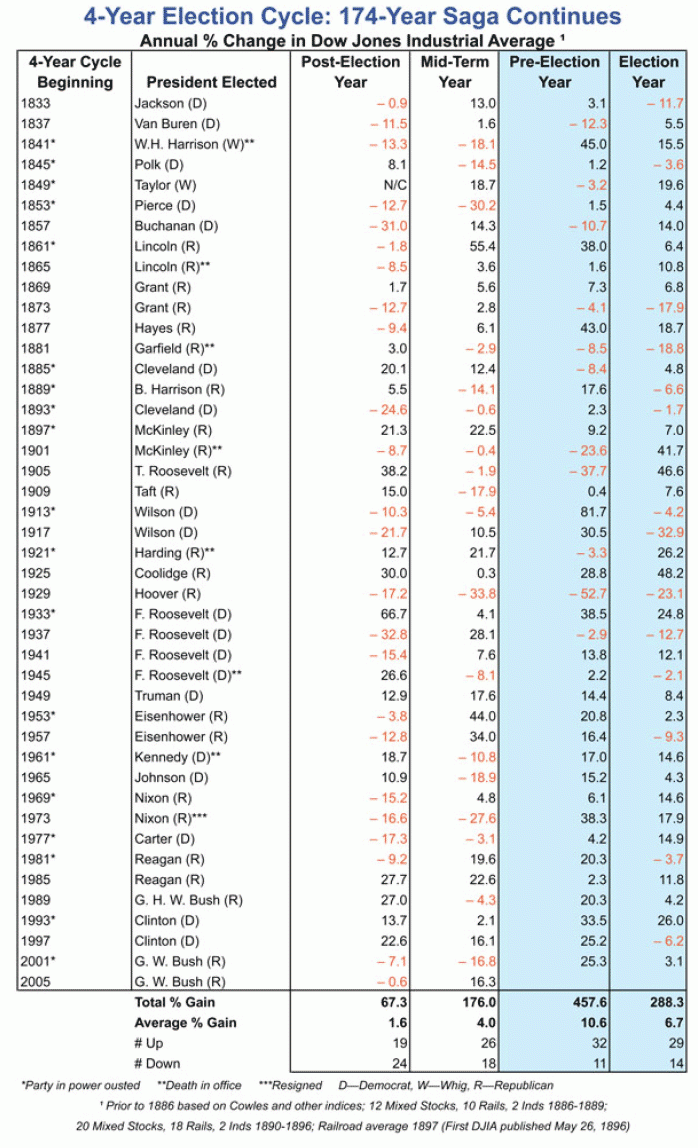
By What Measure?
The last two years of the of the four year election cycle have accounted for a total Dow gain of 745.9%, dwarfing the 243.3% gain of the first two years. There have only been 11 down Pre-Election years since 1833 and none since 1939 when German tanks rolling into Poland spooked the market. Election years have a mixed record, up 29 and down 14 times since 1833. The markets act as a barometer for the economy. When the markets are up, corporate profits are up, there is an increase in good paying jobs and wealth grows. People are happy. The converse is true in a down market, resulting in dissatisfaction and a demand for change. At least that has been the theory, but there is a definite paradigm shift in this line of reasoning.
This isnít your fatherís Dow Jones Industrial Average. Fifty years ago, the Dow 30 stocks derived their earnings domestically and employed the vast majority of their workers within the lower 48. Today every Dow 30 stock as well as the NASDAQ 100 and the lionís share of the S&P 500 are multinationals. Income for these multi-billion dollar companies is being generated from the four corners of the globe and their workforce is scattered not across states, but across continents.
Donít underestimate the power of the worldís largest economy. The domestic economy obviously contributes mightily to the level of the S&P 500, just not as much as it used to. Politicians can look at the gains in the NASDAQ and cite the statistics as a positive; but a waiter at the Applebeeís in Ames, Iowa could give a hoot that the Dow is up 15%. His job and his paycheck and the purchasing power of his hard earned dollars matter, and when November 4, 2008 rolls around the trade imbalance with China, the issue of the line item veto and even the War will matter less than how much cash is in his wallet. ďItís the economy, stupid!Ē
The election year is a crucible for economic data. Inflation, the unemployment situation and the value of the dollar is a big deal all of the time, but on the stump it is in the limelight. Contenders for the oval office have a field day if the economy is faltering. This is why a sitting president primes the economic pump in the Pre-Election year and then hopes that the well doesnít run dry. It is also why the piper is generally paid in the year following the election.
The Four Horsemen of the Economy (4 charts)
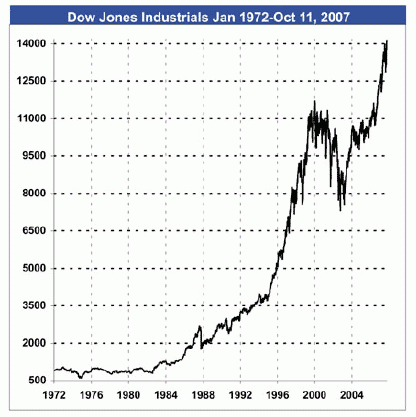
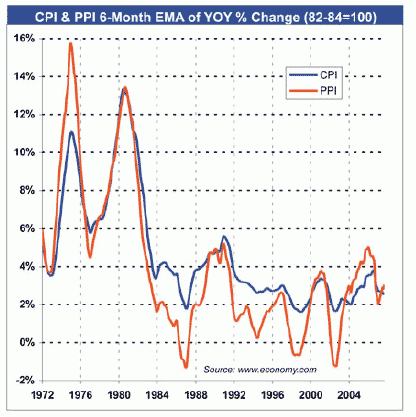
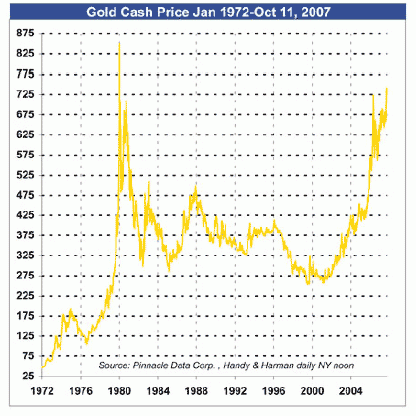
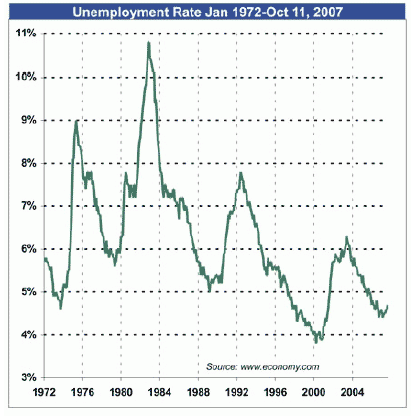
Inflation
We have issues with the way inflation is gauged. We expounded deeply on the subject in the June 2006 Proving Grounds. Nonetheless, the CPI and PPI are still the benchmarks and must be considered the prime standard for lack of a better measurement. Increasing inflation has been a problem for incumbents, while stable, or better yet, a decreasing CPI and PPI have often preceded victory. In 1976, inflation stood north of 14% when the Democrats won. In 1980, the tables were turned as the decline in inflation proved fleeting and Reagan swept into the oval office. In 1984 and again in 1988, when Republicans maintained control of the White House, inflation hovered around 4%. When Clinton won in 1992, inflation was percolating, surging towards 6%. When Bush 43 won in 2000, inflation was on the rise.
Currently, the PPI has begun to rise which has often been a precursor to inflation on the consumer level. The Fed will fight inflation as this is their prime directive. Mr. Bernanke has done a diligent job and his policy making has thus far been impeccable. As Election Day gets closer, these numbers will be increasingly more important and may portend the outcome.
All That Glitters Is Gold
There is a confluence of factors that dictates the price of gold. While high prices in hard commodities such as copper, nickel or even oil have their basis strictly in supply and demand, gold is different. The shiny yellow stuff is a proxy for investorsí faith in the markets. A flight to gold has often been in concert with a weakening economy.
This is best exemplified in 1980 when Reagan beat Carter. Gold spiked from around $150/oz when Carter took office to over $800 during his bid for reelection. But the trend for gold had been steadily up since the recession that began in 1974. The malaise that ensconced the country post Vietnam and weighed on the markets and the economy for almost a decade is illustrated by the price of an ounce of gold.
There was little faith that things were getting better so it was best to keep your powder in a golden safe-haven.
Gold has spiked to over $750 recently, and the long-term trend has been up since 9-11 and the brief 2001 recession. While the economy is currently on firm ground, the price of gold is indeed disconcerting. It exemplifies the weakness in the dollar as well as the penchant for speculators to place their bets in arenas other than the US equities market.
Strength in gold is also synonymous with dollar weakness. No matter how deep the current crop of candidates digs their head in the sand, gold, which is priced in dollars, is a testament to the current pathetic state of the greenback. A grandiose crescendo like we saw in 1980 could help the Democrats, while a curtailing of the current trend would bolster the Republicansí effort.
Unemployment: the Granddaddy of all Indicators
Unemployed voters have a darn good reason to clamor for a change. It can be the ultimate downfall for an incumbent party. In 1976, amid the disgust over the fallout of Watergate, unemployment surging to around 9% made the Republicans quest for a stay of execution impossible. Again in 1992, the roster of unemployed Americans turned the tide against Bush Sr. It didnít matter to those on the unemployment line that Bush was scoring resounding victories around the world on the geopolitical front. After all, ďItís the economy, stupidĒ.
An administration, however, can get away with high unemployment provided that they can blame it on the policies of the previous administration. As unemployment climbed to over 10% in 1982 shortly after President Reagan declared that ďwe have inherited the worst economic mess since the depressionĒ. During his successful reelection bid in 1984, the unemployment rate began subsiding and was below 10%.
The Great Communicator had the unabashed support of the country because he was fixing problems caused by his successors. The current economy has enjoyed steady growth for the better part of a decade. Although the quality of jobs available is in question there are indeed jobs to be had. As long as the Republicans can keep Americans employed they will be in decent shape come 2008. It is imperative that they do not allow an increase in the unemployment rate as they will be hard pressed to deflect criticism to the Democrats.
Recently the unemployment rate has begun to trend upwards towards 5%, but remains in favorable territory for the Republican contenders.
The Final Countdown
President Bush has enjoyed a fairly successful Pre-Election year thus far. The Dow is up a respectable 13%. The economy remains in expansion, inflation is in check and jobs abundant. The only blemish is the brutal state of the dollar which has been getting significant attention lately. But the pump has been effectively primed.
We are entering primary season and all aspects of the economy are in play. The War will and should dominate the debate, but donít kid yourself. Americans have become somewhat calloused to the situation in the Middle East and Afghanistan.
Aside from the noble families of solders serving in the armed forced, few Americans have had to make a direct sacrifice for the War. Although one may agree or disagree with the current administration policies, as long as they have a good job, inflation is in check, and their take home pay is covering the bills, there is little catalyst for change. It really is the economy, stupid! As we motor towards Election Day keep an eye on the four horsemen of the economy that we have laid out in this piece. It will shed significant light on what has been an extremely muddled situation thus far.
J.Taylor Brown
www.StockTradersAlmanac.com












